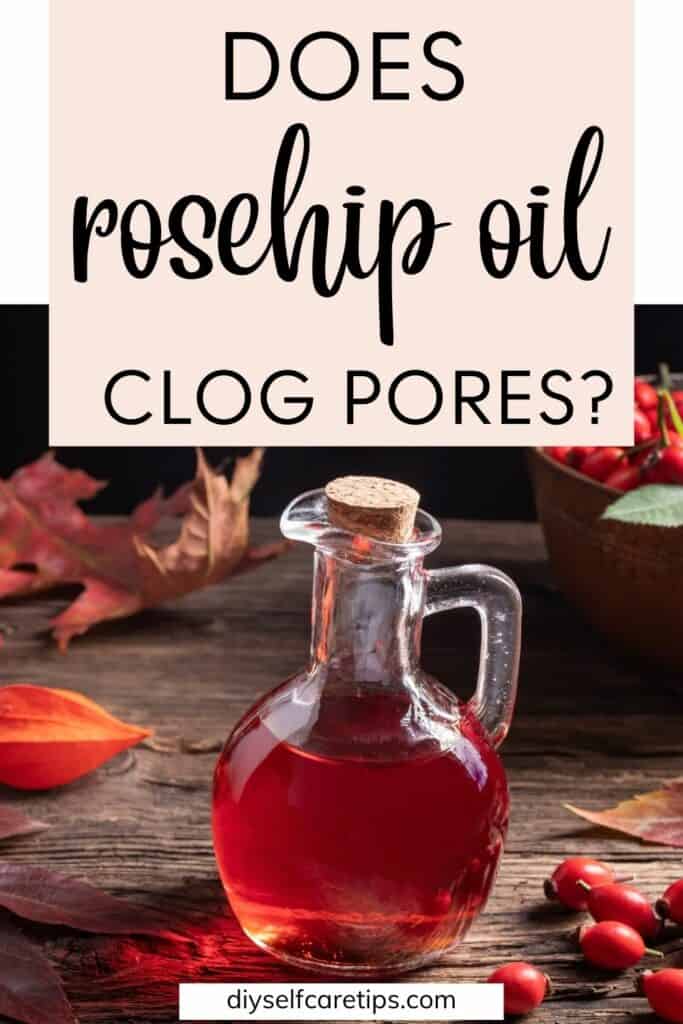Does rosehip oil clog pores? Or does rosehip oil cause acne? These are some of the most contentious concerns that have many people wondering if oil and acne can coexist. Let’s learn whether using oils like rosehip oil for acne and clogged pores helps resolve such issues.
To develop further insight on the aforementioned questions and to know more on rosehip oil, scroll down.

What is Rosehip Oil?
Rosehip oil, also recognized as rosehip seed oil, is an extracted seed oil that has been prized for its various therapeutic qualities since ancient times. This makes it particularly beneficial for all people dealing with sensitive skin and its related issues. It is a wonderful asset that you can easily obtain from the tiny fruit that grows underneath the rose. Rosehip oil is currently a popular component in skincare due to its moisturizing and anti-aging properties.
It is also rich in skin-nourishing minerals and vital fatty acids. Plus point is that it also includes polyphenols in it, which seems to have antimicrobial and antifungal activities. Experts use it more as a carrier oil for essential oils that are too potent to apply straight on the skin.
Benefits of Rosehip Oil on your Face
There are ample amount of benefits that rosehip oil offers. Let me walk you through some of the fantastic advantages that it has when you apply it to the skin.
The benefits of rosehip oil are;
- It moisturizes your skin perfectly. Rosehip oil, which is high in omega-3s, can obstruct your skin. This obstruction causes a barrier that locks in moisture and inhibits dryness, making it suitable for those with mature or dry skin.
- It minimizes wrinkles and fine lines from the skin. The rejuvenating vitamins A and C and calming vitamin E in rosehip oil also assist in reducing the appearance of fine lines and wrinkles. This also supports collagen development over time.
- It is effective in the fight against acne. Rosehip oil reduces inflammation by having anti-inflammatory and antibacterial effects. Vitamin A is also included, which aids in the regulation of sebum production.
- Unlike other oils, rosehip oil is non-aversive It is non-irritating since it is free from strong perfumes and other potentially sensitive chemicals. It also has an earthy and natural aroma. This freshens up the mind as well.
- Rosehip helps you to heal with skin irritation and inflammation-It contains vitamin A and important fatty acids, which assist to calm skin irritation caused by acne or rosacea.
- It reduces the clogged pores. Also, helps with acne scars by containing Vitamin A, which heals wounds and aids to relieve inflammation. Both of these are essential contributors to scarring.
- Rosehip oil has immense levels of antioxidants which assist to reduce inflammation and fighting free radicals to promote premature aging.
- Using rosehip oil for large pores works wonderfully because of the high concentration of linoleic acid inside it.
Does Rosehip Oil Clog Pores?
When it comes to facial skin care treatment, you want to have something nourishing and delicate that won’t block your pores. Well, we have gotten the best way to prevent the pores from clogging. Rosehip oil fulfils all of the requirements. This oil is a non-comedogenic oil, which implies that it won’t clog your pores.
Rosehip oil also aids in the regulation of sebum production, reducing the likelihood of recurrent breakouts. And allowing you to retain the natural oils of the skin and to keep them under control.
This further answers the question, “Does vitamin E clog pores?’ I am sure by now you all must be aware of the fact that vitamin E is present in rosehip oil. If the oil itself doesn’t clog pores, it becomes evident that vitamin E also serves the same function.
Is Rosehip Oil Good for Acne?
As mentioned above, rosehip oil is beneficial for oily skin since it is non-comedogenic, meaning it does not clog pores or promote acne breakouts. It also aids in monitoring the levels of sebum and contains anti-inflammatory and antiseptic qualities that can aid in the treatment of acne. Rosehip oil is excellent for oily skin as it penetrates fast and hydrates the skin without leaving it greasy.
However, be mindful that rosehip oil shouldn’t be your first line of defence against acne. Rosehip oil, after all, is still oil that creates an oily barrier on your skin, making it seem a bit greasy, clogging your pores, and potentially worsening your acne.
How Long Does Rosehip Oil Take to Fade Scars?
There is no fixed answer to this question because it varies from person to person. And this largely depends on the number of factors that can contribute to how applying the rosehip oil works for everyone.
These may include how old the scar is and as well as the type and size of the scar. It won’t happen quickly, so expect it to take weeks or even months to notice a distinguishable difference.
Can Rosehip Oil cause acne and breakouts on the skin?
There are many misconceptions regarding rosehip oil and this is one of them. People believe that rosehip oil can cause acne or breakouts. However, it’s not true. It doesn’t cause any such issue if you use it appropriately and as suggested. Rosehip oil absorbs fast into the skin. This is why it can sometimes serve the purpose of a dry oil.
It is non-pore clogging and will only be effective if you use it in little doses. Using is 2 to 3 drops on the face either once or twice a day is advisable. Rosehip oil includes Omega 3 and Omega 6 essential fatty acids, which our body doesn’t produce but are crucial for good skin. They help to reduce inflammation and support the formation of healthy skin.
Dry, rough, or itchy skin might be the result of a lack of certain nutrients. This further clarifies that due to the lack of sufficient nutrients, a person may suffer from acne and breakouts. So rosehip oil alone doesn’t particularly cause such side effects if used properly. Rich intake of fats and skincare products high in Omega 3 and 6 can provide essential fatty acids which can be the cause as well. This oil also aids in the restoration of your skin’s natural PH balance and moisture content. As a result, using rosehip oil on your skin can be beneficial.

What type of acne does rosehip oil work for?
Rosehip oil may have the greatest direct impact on inflammatory acne conditions due to its anti-inflammatory properties. This includes the following;
- Cysts- Large, fluid-filled pimples grow deep beneath the skin.
- Pustules- bumps that look like papules but are wider and contain pus.
- Nodules- Solid lumps that appear beneath the skin’s surface
- Papules- Small, inflammatory pimples that seem to be red or pink emerging from enlarged pores.
With non-inflammatory acne or congested pores, you may still enjoy the benefits of rosehip oil.
Vitamin A and linoleic acid in the oil serve to control the production of oil, which can serve to inhibit the development of blackheads and whiteheads.
How long does rosehip oil last?
Rosehip oil is rich in linoleic acid and has a very short shelf life. This causes the rosehip oil to expire quickly as compared to other oils. This is why you should utilize it within 3 to 6 months of its opening. Also, make sure that you store it in a cool dark place.
Does rosehip oil have side effects?
Rosehip oil has few side effects. Just like every other oil, it can also lead to allergic reactions depending on the type of skin you inherit. So conducting a patch test before applying it on the face or any part of the body is suggestible. Symptoms of an allergic reaction can vary from mild to severe.
On the other hand, it can also cause some other health-related concerns such as;
- Rashes or skin infection
- Breathing problems
- Fast heartbeat
- Drowsiness
- Chest Congestion
- Watery eyes
How to Use Rosehip Oil on your Face?
Rosehip Oil is a mild facial oil that you can you as it is or in combination with other moisturizers. Just place a few drops (2–3 drops are adequate for your face). Add a few drops extra (to benefit the shoulder and neck region as well) in the palm of your hand. Carefully rub the oil all across your face and neck with the tip of your index finger. Then, using upward movements, gently massage the area. The oil absorbs rapidly and leaves no oily residue behind.
Employ rosehip oil as a hand moisturizer each time you wash your hands for younger-looking hands and to combat aging skin.
Finally, Does Rosehip Oil Clog Pores?
Absolutely not. In fact, it is by far one of the most nourishing and anti-inflammatory oils that will help you to recover from acne and clogged pores.
If you are still confused with questions like “Is rosehip oil good for acne?”, I would suggest you to use it once only and experience it yourself because using it practically will clear out the confusion even further.